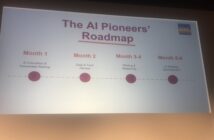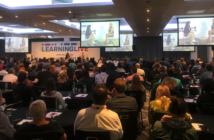If last week’s chat2lrn Twitter chat on ‘What #learners want’ is anything to go by, it would seem that L&D professionals are divided on what to call the very people they are supporting.
Below are some of the tweets from last week’s chat that show some of the views on the topic. So, who’s right? And does it matter? Please feel free to add a comment.
What’s in a name? Can I call you a ‘learner’?
Last week’s chat2lrn Twitter chat on ‘What learners want’ touched on the issue of what to call the people L&D teams are there to support. Here are some of the tweets on the issue.
Storified by Martin Couzins· Mon, Apr 08 2013 02:53:50
#chat2lrn @chat2lrn Don’t call them learners would be a start…Andrew Jacobs
a4) So why don’t we just stop calling them "learners" right now? Now. #chat2lrnpatti Shank PhD CPT
Q4 @charlesjennings – do you think L and D see their customers as learners or workers? #chat2lrnlaura Overton
@lauraoverton Many L&D professionals see their customers as ‘learners’ (or even ‘patients’ !) not ‘workers’, ‘colleagues’ etc. #chat2lrncharles Jennings
a5) going back to @charlesjennings point should we stop calling people learners and call them employees/workers? #chat2lrnlesley Price
Q5) Stop thinking of them as LEARNERS but as people who need to know how you can help them to do their jobs effectively #chat2lrnjane Hart (C4LPT)
Q5) LEARNERS implies they need to study or memorise something, when that is probably the last thing they need chat2lrnJane Hart (C4LPT)
@c4lpt always interesting to see how L&D folk frame power relationships (ie, "learner") chat2lrnJane Bozarth
@judithels @pattishank whats wrong with learner. its nice, its true, its respectful #chat2lrnhenry Stewart
Qwrap) Take-away: eliminating the term "learner" can change thinking in a productive way #chat2lrntom Spiglanin
qwrap) chat2lrn Education – school and university – has LEARNERS; the workplace has WORKERS (learning is just one aspect of working)Jane Hart (C4LPT)
@ColinSteed @pattishank @happyhenry Yes, we are all learners. I call people whatever is appropriate. The chat2lrn was about ‘learners’ :-)J Christian-Carter
Learning Styles"a testament to the gullibility of even well-informed individuals who should know better" goo.gl/HrzmS @guywwallaceCharles Jennings
[Picture credit: Billy Alexander]





11 Comments
Labels – be it learner, worker, participant or individual – can help or hinder our understanding of the needs of the ‘users’ of learning services. The trouble is , we use those labels to define our understanding of their needs and it’s just not as simple as that.
Over the year’s I’ve found it more useful to think about what is day job?What keeps them awake at night? People at work are not full time learners and shouldn’t be treated as such. But they are not just workers either.They are nurses, engineers, project managers, administration assistants ….. and all have different needs in different circumstances. Using the term worker or individuals doesn’t necessarily shed light on that fact either.
This conversation has been useful, as Tom says, to ‘change our thinking in a productive way’ but we need to constantly challenge our assumptions.To do that, we need to look beyond all labels that we use if we are truely going to understand how to support the people behind them.
I don’t really like the label ‘learner’ very much. It implies a power relationship that is teacher-learner. It also sounds a little patronising. I also don’t like ‘workers’ or even ’employees’. I agree with Laura that we can get into trouble when we use ‘labels’ but we do sometimes need a ‘word’ that collectively describes people or do we? 😉
Thanks for the comment, John. My view: articulating learning is a nightmare because it is existential – it is what all humans do. I think there is a huge opportunity for L&D to rewrite the ‘training’ narrative to focus on lifelong learning and skills, experience, knowledge. We do not need a label for our colleagues we are trying to support.
All for the re-writing the ‘training’ narrative….a new human capital manifesto maybe? 😉
What a great idea!
I can see why us L&Ders have the need to define our delegates. After all they’re just learners who want to be users if information that enables them to be more productive workers.
Us, being the subject matter experts, like to facilitate and guide a conversation because of our expertise. At the same time, the group listening to the gurus, and finding ways to be social with the content means that they’re informally assimilating all this knowledge for their future gain.
Whew. I’m exhausted with all of this information delivery I’m passing on to the various participants willing to give me the time of day.
Thanks, people.
Thanks for the comment, Sukh. Ha! You’d better have a lie down after that 🙂 I’ve never called myself a ‘learner’ in the workplace, just ‘me’ who needs to learn stuff. If I was called one I’d ask, ‘Why you calling me a learner?’ . . . it’s like calling me a ‘human’. Labels!
Nice to see this conversation is continuing. I forgot to add this at the time – a blog post from December:
http://lostanddesperate.com/2012/12/19/who-do-you-work-with/
Hi Andrew. Thanks for the comment and link – enjoyed your post on this topic and agree that a language set apart from the rest of the business puts L&D in danger of being seen as totally out of touch. That said, I am drawn to the ‘learning’ narrative as a wholly positive thing – it works for individuals and organisations. It particularly works around creativity, innovation and leadership. The learning narrative fares badly in education but that doesn’t mean to say it can’t be reclaimed by L&D.
I’m excited to see we’re carrying on this conversation. I see how hard this is because it’s esoteric and on some level it seems ridiculous. But labels matter. Calling people “learners” does imply a power relationship so that has to stop. We aren’t handing people the keys to the kingdom with our work. People learn on their own every day and truthfully, they often learn better without us. So calling them learners implies that we are the givers of knowledge and skills. Um, we’re not. We are (hopefully) facilitating something which is beneficial, but we do that with their guidance and help. We’re in this together. So what label does that imply? A partnership of some sort…
Hi Patti. Thanks for your comment and agree, it’s great the conversation has picked up. Great points here too. Like the partnership perspective – a tough one to articulate though?